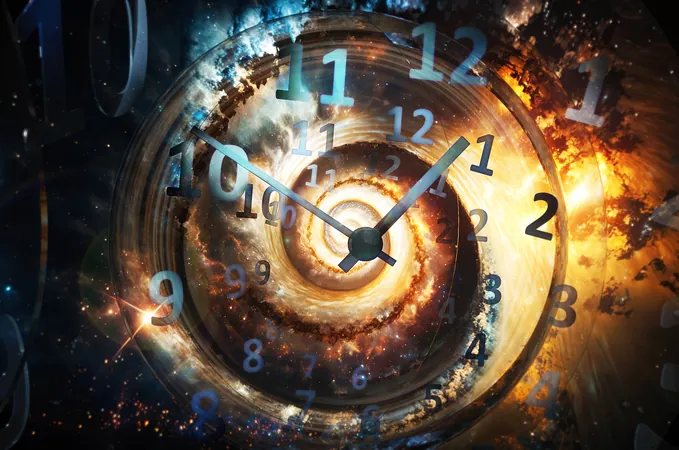
Are We Living in a Time Illusion? The Fascinating Debate Among Physicists
2025-01-10
Author: Wai
The Concept of Time Under Scrutiny
Many researchers now propose that our presumed “flowing now” could merely be a construct of our perception. Studies suggest that our everyday reliance on the distinctions of past, present, and future is fundamentally flawed. We schedule our lives around this concept, from setting alarms to paying bills, yet the equations of physics provide little clarity on what constitutes the “present moment.”
One prominent voice in this debate is Dr. Carlo Rovelli, a theoretical physicist renowned for his work on loop quantum gravity, which often omits standard notions of time altogether. His research underscores a significant divide between our subjective experiences of time and its objective description in physics.
Time: A Question of Perspective
Our instincts tell us that the present moment holds significance while the future remains uncertain, and the past is etched in stone. Yet Einstein’s theories imply that perhaps every moment is equally real, muddling our understanding of a universally shared present.
Notably, scientists have proven that time is affected by gravity – clocks indeed run slower in stronger gravitational fields. This relativity implies that time may not only vary based on speed and distance but is also inherently subjective, confirming that our experiences often diverge from scientific reality.
The Illusion of Time’s Flow
We often feel that time flows incessantly, pushing events from future to past. However, modern physics suggests no absolute flow exists within the framework of general relativity. Some theorists propose that this illusory flow may arise from correlations among objects in motion, with our memories and narratives crafting the sequence of “before” and “after.”
Einstein and the Fabric of Time
Einstein's groundbreaking theories reshaped our conception of time. His special relativity indicates that time is not a uniform constant, evident in phenomena such as “time dilation,” where high-speed travelers encounter time differently than stationary observers. Further, in his general relativity theory, he demonstrated that increased gravitational fields can slow down time, fundamentally altering our notions of a stable time continuum.
Quantum Mechanics Introduces Further Complexity
The realm of quantum mechanics adds layers of complexity to our understanding of time. Traditional physics treats time as a constant sequence, yet quantum experiments reveal that a universal “right now” cannot be universally defined. The Wheeler-DeWitt equation exemplifies this shift by omitting time, suggesting that reality might be more about entanglement of parts, rather than a flowing timeline.
The Arrow of Time and Entropy
Despite theories positing time as an illusion, we unavoidably perceive a directional flow that aligns with the increase of entropy — the concept that systems tend to move toward disorder. The second law of thermodynamics enhances our understanding, demonstrating that this trend toward chaos gives rise to our perception of moving from past to future.
Humans and the Illusion of Time
Some scientists speculate that time may eventually be regarded similarly to currency: a tool for accounting rather than a fundamental reality. Despite this possibility, our lives remain anchored in the belief that each moment is significant, which fuels our daily routines.
As we continue to navigate life under these time constructs, a pressing question arises about the nature of our attachment to the flow of time. Will humanity ever evolve its understanding to grasp the true nature of time?
Only time will tell.
For anyone intrigued by these mind-bending concepts, the implications are vast — revealing insights not only about time itself but about our existence in the universe. Stay tuned to uncover more as researchers delve deeper into this captivating and perplexing topic.



 Brasil (PT)
Brasil (PT)
 Canada (EN)
Canada (EN)
 Chile (ES)
Chile (ES)
 Česko (CS)
Česko (CS)
 대한민국 (KO)
대한민국 (KO)
 España (ES)
España (ES)
 France (FR)
France (FR)
 Hong Kong (EN)
Hong Kong (EN)
 Italia (IT)
Italia (IT)
 日本 (JA)
日本 (JA)
 Magyarország (HU)
Magyarország (HU)
 Norge (NO)
Norge (NO)
 Polska (PL)
Polska (PL)
 Schweiz (DE)
Schweiz (DE)
 Singapore (EN)
Singapore (EN)
 Sverige (SV)
Sverige (SV)
 Suomi (FI)
Suomi (FI)
 Türkiye (TR)
Türkiye (TR)
 الإمارات العربية المتحدة (AR)
الإمارات العربية المتحدة (AR)